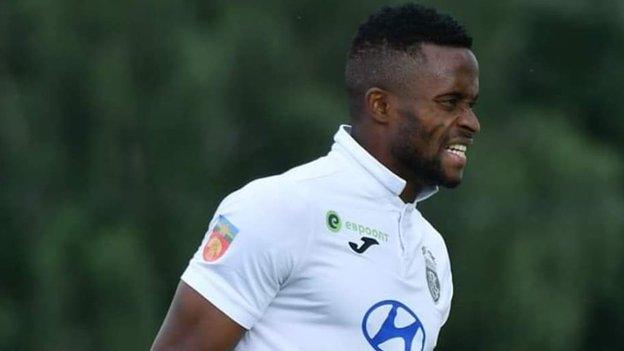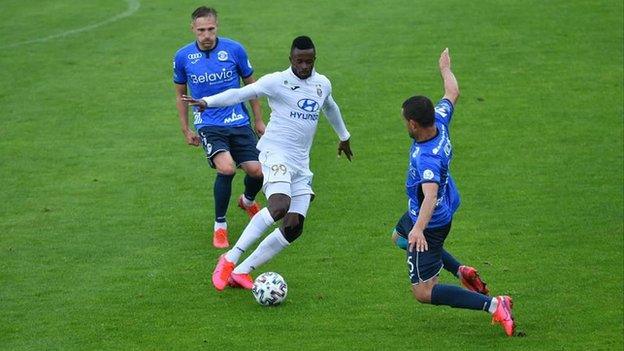Guinean footballer Momo Yansane on coping with racism and playing during Covid
- Published

Guinean Momo Yansane has endured tough times in both Morocco and Belarus
Guinean footballer Momo Yansane has endured his share of struggles in recent years including racism and playing during the coronavirus pandemic.
The 23-year-old is now playing for Isloch Minsk Raion in Belarus after leaving Moroccan side FUS Rabat last year, initially on loan.
Yansane left Morocco under something of a cloud after getting little playing time, enduring a strained relationship with the then coach Walid Regragui and battling racism.
"There was a lot of racism, even some from my fellow teammates," the striker told BBC Sport Africa.
"The more you train together, the more you are together, the more you can discover. Some of the Moroccan population is racist as well.
"Sometimes, when you went for a walk or you spoke to someone they treated you in a racist way."
He recounts that he was sometimes the target of the very worst of racial insults while in Morocco.
Hopes of an easier life in Europe after his loan move were short-lived as he had to adapt to his new club environment, the cold climate and navigate a language barrier with the help of his mobile phone.
On the pitch however the youngster quickly settled down as he scored fifteen goals in all competitions in his first season.
Despite signing a permanent deal with Isloch Minsk, 2020 has proved to be another daunting campaign for Yansane.
Playing during Covid
In March, the Belarusian top flight captured the international headlines when the league defied the game's global shutdown in the wake of the coronavirus pandemic.
The Belarusian Premier League continued to play and fans were still welcome to attend matches as the country's President Alexander Lukashenko said that concerns about the coronavirus pandemic were "psychosis".
Yansane acquiesced to the decision of the local authorities and sporting governing body, but not without concerns.
"It was very difficult to remain indifferent given that other countries were fighting the coronavirus," recalls Yansane.
"I felt forced to play, but it wasn't my decision. I asked the club to test the players every week because it is an infectious disease.
"It contaminates and it can go very fast. If the club had refused, I would also have refused to train. When you conduct the tests weekly, that is encouraging."
At Isloch Minsk, Yansane and the other players wore masks and gloves and used disinfectant as part of the club's protective measures against the coronavirus.
Even so, a number of Yansane's colleagues returned positive tests in May and were placed in quarantine.
Individual and collective training sessions were however never interrupted and after practice Yansane stayed at home even if Belarus never imposed a lockdown.

Momo Yansane had concerns about continuing to play football in Belarus during the global coronavirus pandemic
"When you see that your colleagues with whom you train contract it, you are worried," says Yansane.
"My mom, my brother, my sister called me to know how I was doing and how my health was.
"Everyone was worried, you know, but it is my work and I couldn't abandon it. Today, one doesn't talk too much about the coronavirus.
"At my club, there have been no more positive cases. Everyone is doing well, but what remains clear is that we haven't forgotten coronavirus still exists. We take care."
Personal tragedy
Just as Yansane was accepting his 'new normal', his mother passed away from cancer on 27 July, two days before his 23rd birthday.
The passing left him sad, shaken and alone in Minsk, where he has no friends.
"My mum is everything to me," explains Yansane.
"I loved her so much. I work and fight for my family and her and now when my mother and my father are no longer there, I asked myself what I am going to do with my life?"
Things were made worse when his club told him he could not return home for the funeral to reunite with his sisters and pay his final respects to his mother.
Yansane said he did not want to discuss the reasons behind the club's refusal to allow him to attend the funeral.
"The club wasn't really professional," says Yansane.
"That hurt me, that hurt me a lot. They didn't help, psychologically and mentally. I told myself - I am in a very complicated situation, but I will lift my own spirits."
Instead he drew strength from conversations with Ibrahima Fofana, a Guinean who plies his trade at another club in Belarus, FC Belshina Babrousk.
He added that there was good advice from his coach Vitaly Zhukovsky and his three Nigerian club colleagues.
Political tension in Belarus
His weeks of intense grief coincided with nationwide protests against Lukashenko, who is often referred to as 'Europe's last dictator'.
After an 80% landslide for the incumbent president in the elections on 9 August, Belarusians took to the streets.
From his apartment in the capital Minsk, Yansane witnessed how the city became the epicenter of the demonstrations.
"When I do groceries, I have seen people protesting," says Yansane.
"The people are against the president because he has been in power for 26 years. They want change, 100%. It depends on them."
Despite the social unrest, social isolation, Covid-19 and his mother's death, Yansane is determined to make the most of his time in Belarus.
Before the international break, he scored a decisive brace in a 2-1 win against Dnepr in the domestic cup.
He wants to grow at club level and get a recall from coach Didier Six for the national team as well.
"I have to reach my goals," concludes Yansané.
"That is to go as far as possible, to reach my dreams and my dream league."